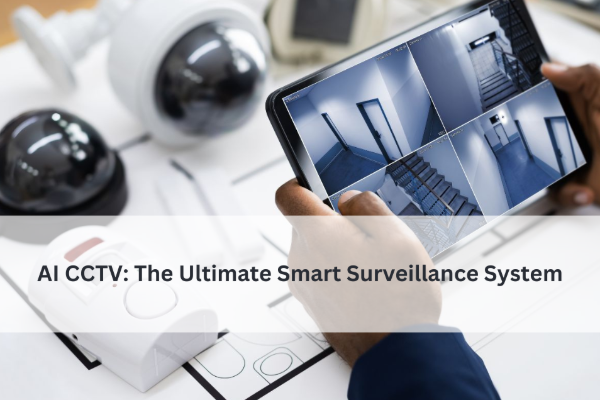Introduction: The Era of Artificial Intelligence in Security
In today's rapidly evolving technological landscape, AI-powered CCTV cameras have transcended traditional surveillance tools. These sophisticated systems now function as intelligent solutions capable of analyzing, interpreting, and responding to situations with remarkable precision and insight.

Evolution of CCTV Systems: From Past to Present
Early Stage: Traditional CCTV Cameras
Traditional surveillance systems were characterized by significant limitations:
- Static image recording with minimal functionality
- Low-quality, grainy footage
- Continuous, indiscriminate recording
- Absence of intelligent features
Present Day: AI-Powered CCTV Cameras
Modern AI-driven cameras represent a quantum leap in security technology:
- Advanced AI-based analytics
- Automatic intelligent motion detection
- High-resolution 4K image quality
- Real-time intelligent alerts
Core Technologies Behind AI CCTV Cameras
1. Artificial Intelligence Processing System
Cutting-edge AI technologies enable unprecedented capabilities:
- Complex pattern recognition
- Sophisticated anomalous behavior analysis
- Precise object and person differentiation
- Instantaneous real-time processing
2. Smart Detection System
Intelligent detection mechanisms provide comprehensive surveillance:
- Advanced facial recognition
- Accurate person identification
- Precise movement direction tracking
- Intelligent differentiation between humans, animals, and objects
3. Data Storage Technologies
Robust and secure data management solutions include:
- Cloud storage with scalable capacity
- Network Video Recorder (NVR) and Digital Video Recorder (DVR) options
- Automatic backup systems
- High-security data encryption protocols
Advantages of AI CCTV Cameras
Residential Applications
- Instant alerts for unrecognized individuals
- Comprehensive household movement monitoring
- Secure remote surveillance of private spaces
Business Use Cases
- Proactive theft prevention
- Employee behavior and performance tracking
- Detailed movement analysis in production environments
- Reliable legal evidence documentation
Selecting the Right AI CCTV Camera
Key Selection Criteria
1. Image Resolution
- 2K (1080p) for standard requirements
- 4K (Ultra HD) for enhanced clarity
- 8K for extensive coverage areas
2. Viewing Angle
- Narrow-angle for focused surveillance
- Wide-angle for broader coverage
- 360-degree omnidirectional monitoring
3. Connectivity Options
- WiFi for wireless convenience
- Ethernet for stable connections
- 4G/5G for mobile flexibility
- Bluetooth for peripheral integration
4. Storage Systems
- Cloud storage with remote access
- Local memory card options
- Internal hard drive for comprehensive recording
Legal and Privacy Considerations
Privacy Protection
- Install cameras only in authorized private areas
- Explicitly inform individuals about recording
- Strictly avoid personal privacy violations
Data Security Measures
- Implement regular password updates
- Conduct frequent software maintenance
- Deploy robust anti-hacking protection systems
FAQ – AI-Powered CCTV Cameras
- Q1: What makes AI-powered CCTV cameras different from traditional ones?
A1: AI cameras don't just record—they analyze. They use advanced algorithms to detect unusual behavior, recognize faces, track movements, and send real-time alerts, offering a proactive approach to security.
- Q2: Can AI CCTV cameras recognize people or faces accurately?
A2: Yes, with features like facial recognition and object classification, AI cameras can accurately identify known individuals, differentiate humans from pets or objects, and track movement direction.
- Q3: Are AI security cameras suitable for homes, or only businesses?
A3: They're suitable for both. In homes, they provide instant alerts and remote monitoring. In businesses, they help with theft prevention, employee tracking, and safety compliance.
- Q4: Is the data from AI CCTV cameras secure?
A4: Yes, especially when stored in encrypted formats or cloud systems. Regular password changes, firmware updates, and anti-hacking protocols further protect the data.
- Q5: Do AI cameras require a constant internet connection?
A5: Not always. While cloud-based features benefit from connectivity, many AI cameras can record locally and process analytics offline.
Related Reading
If you're curious about how face recognition technology works in these systems—and whether it's really safe—explore our in-depth article here:
👉 Face Recognition Technology in CCTV: Is It Really Safe?
Uncover the benefits, concerns, and privacy implications of facial recognition in AI surveillance systems.
Conclusion: The Future of Security
AI-powered CCTV cameras represent more than mere recording devices; they are comprehensive, intelligent security ecosystems. Selecting the right system ensures effective protection of lives, property, and valuable assets.
